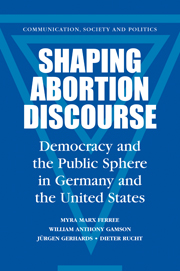Book contents
- Frontmatter
- Contents
- Tables and Figures
- Foreword by Friedhelm Neidhardt
- Preface
- Glossary
- Part I Introduction
- Part II Major Outcomes
- 4 The Discursive Opportunity Structure
- 5 Standing
- 6 Framing
- Part III Representing Different Constituencies
- Part IV The Quality of Abortion Discourse
- Methodological Appendix
- References
- Index
6 - Framing
Published online by Cambridge University Press: 15 December 2009
- Frontmatter
- Contents
- Tables and Figures
- Foreword by Friedhelm Neidhardt
- Preface
- Glossary
- Part I Introduction
- Part II Major Outcomes
- 4 The Discursive Opportunity Structure
- 5 Standing
- 6 Framing
- Part III Representing Different Constituencies
- Part IV The Quality of Abortion Discourse
- Methodological Appendix
- References
- Index
Summary
Frames are central organizing ideas that provide coherence to a designated set of idea elements. They should not be conflated with policy positions. It is important to understand that in both countries, policy debates are actively carried on among participants who disagree on the best policies but nonetheless share a frame for asking questions. Other actors may agree on policy but frame the problem that the policy addresses in very different ways.
If the abortion question is framed as “how can the state protect human life before birth?” one can answer that question by advocating draconian legal punishments to deter abortion. But, alternatively, one can advocate state incentives to the pregnant woman to carry the fetus to term plus public health measures to improve the health of both the pregnant woman and the fetus. Although these policy approaches differ, they are both answers tailored to a specific framing of what the abortion issue is about.
They entirely ignore a different question, “Do limitations on a pregnant individual infringe on the right to control one's own body that all citizens hold?” Here, too, answers may differ considerably. One may stress the limits on her freedom imposed by the presence of another human life, or argue about the self-defense rights of a woman against an undesired invader, or defend the right to terminate a pregnancy as analogous to seeking any other sort of medical care.
The issues highlighted in the first discussion take for granted the presence of an “unborn baby” and government responsibility for it.
- Type
- Chapter
- Information
- Shaping Abortion DiscourseDemocracy and the Public Sphere in Germany and the United States, pp. 105 - 128Publisher: Cambridge University PressPrint publication year: 2002



